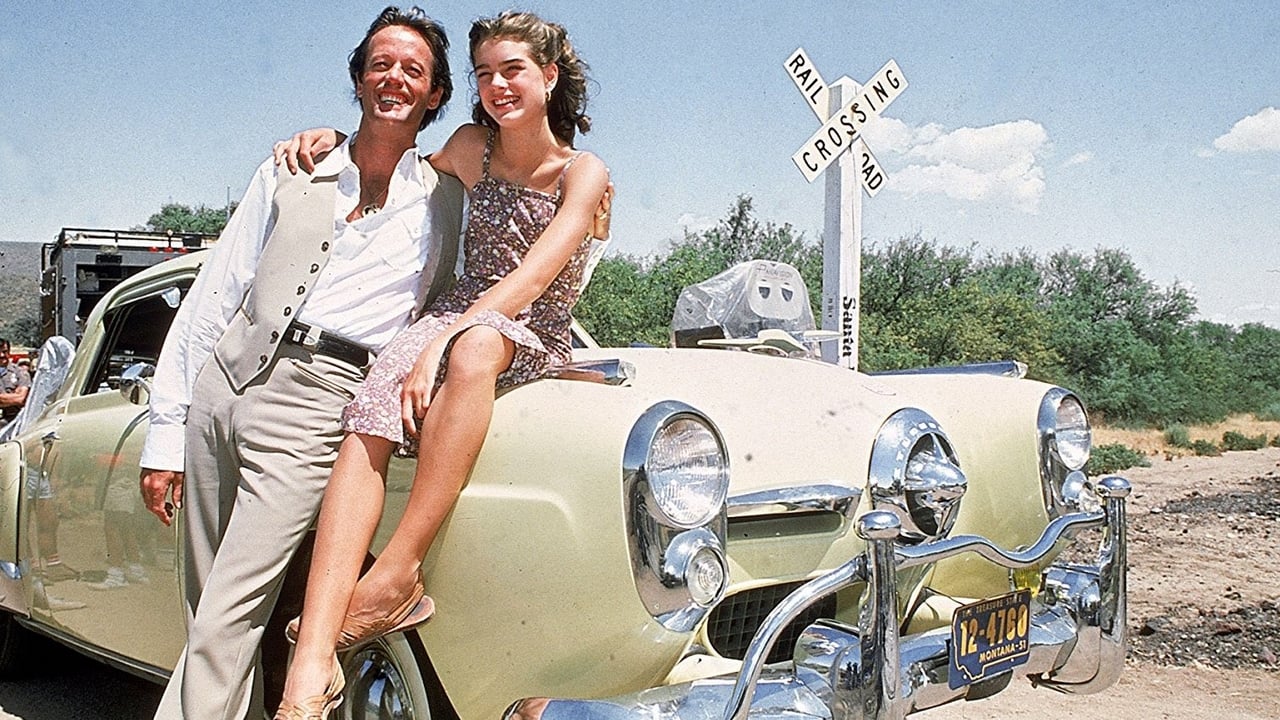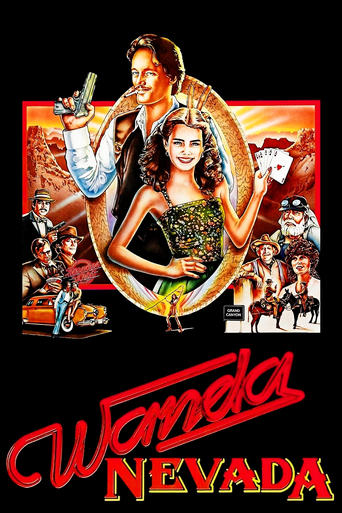

I find it offensive that so many reviewers have sided with Wanda's oppressors and would rather see her locked up in a "reform school" -- where the only thing that would be re-formed is her sweet spirit. Why have so many people still not realized that chronological age is not an accurate gauge of anyone's emotional maturity? As a Master Yoga Therapist and Jungian, I know that men with black-and-white morality values cannot face finding a thirteen-year-old sexually or romantically attractive; so they suppress their desire and compensate by rejecting the catalyst. A similar syndrome is the father who compensates for an unconscious desire for his daughter by rejecting all her potential suitors as "not good enough" for her. Older women often have problems with those who are young and attractive.The precious message of this charmingly unpretentious film is this: All General Rules of behavior must be given room for grand exceptions. After all, it is these that make life worth living.
... View MoreWanda Nevada is a pubescent fantasy movie using circa 1979 ideas of what constitutes illicit romance for 13 year old girls. Script, pacing, and direction are uniformly awful. Action sequences defy belief. Characters speak with the simplified diction one usually finds in films aimed at the under 10 set, but also includes multiple sexual references involving Shields' character as well as graphic deaths. The movie wants to be a comedy on some level but is never funny, an adventure picture but plot and action are insipid, and a children's movie but introduces pedophilia and child rape as real possibilities. It also wants to be a buddy picture, a coming of age picture, a ghost movie, an Indian spiritual movie, a travelogue, and a western. The overall affect is of massive stupidity with a nasty twist. Wanda Nevada is a complete waste of time unless you want to see a good many terrific shots of the Grand Canyon. That it manages to do just fine.
... View MoreIn 1979 I avoided this movie. Such were my tastes then. Most people in my age group at the time, late 20s, were somewhat aghast about the whole Brooke Shields-as-a-movie-star concept. People in my age cohort will remember how she was regarded back then: a little bit gawky, and with her long dark hair, flawless skin, and overpowering eyebrows, she was also seen as preternaturally adult-like, uncomfortably so. Her mother exacerbated that discomfort, with her apparent intent to get her daughter cast into roles to highlight and exploit that preternatural adult-like quality, to essentially sexualize her preteen, early-teens daughter. Mom seemed convinced she had the next Elizabeth Taylor on her hands which she was determined to cash in on. The camera loved Brooke, no question, still and moving cameras alike, she was photogenic her entire life, but this nevertheless was a phase when watching her on screen was on the uncomfortable side. With all that I took a pass in 1979, and never really thought about it again. Brooke went on to have a credible career as a real adult, particularly on television, and particularly after she began making her own career decisions. When thinking about Brooke Shields as she was, her early career, and her being sexually exploited, I've flashed on Pretty Baby and The Blue Lagoon. Wanda Nevada was forgotten about, at least by me.Wanda Nevada was on cable TV this weekend, and I decided to watch it. I must say, it surprised me. Premium cable being what it is, movies shown are shown over and over, so I watched it twice. It is a charming, almost whimsical little movie. Equally charming is Brooke Shields in it. A few things about the movie bothered me, but overall I found myself liking it more than not. This movie is largely Peter Fonda's movie. He directed and he starred as the male lead opposite Brooke Shields, but he didn't write it and he didn't produce it, the importance of which distinctions will become clear below. Fonda directed the players, mainly himself and Brooke. And with Brooke, he did it well. Little Brooke steals the movie.One little thing Fonda could have corrected if he had known to is the annoying repetitive pronunciation of Wanda's last name as "Nev-ah-da," the way many east coast people say it. This movie was set in the desert southwest, where people know how to properly pronounce Nevada, something I know, because I'm from there. Nev-aaa-da. The middle "a" is a short "a", as in bad, mad, sad or dad. Another thing I could've done without was the supernatural sub-text. The Native American lore was great. Even the psychological fear of Indian ghosts by itself would've been great. But when glowing ghost Indian arrows start flying, actually harming and killing real characters, verisimilitude goes out the window, and it stops being a movie which takes itself seriously. My biggest problem with the movie relates to my comments above about the sexualization of Brooke Shields. First, let's be clear: Brooke Shields IS NOT sexualized in this movie, nor is she exploited in that way either. The story itself is nevertheless disturbing. Brooke Shields and her character were 13 years old here, and Fonda and his character were 38. There is no way to mistake or misinterpret the implied intended love interest between them, especially with them riding off into the sunset with one another, which is what we are left with, him 38 and her 13, together, that way, end of story. Beaudray is clearly not Wanda's father figure, guardian, big brother, or business partner. Happily, nothing overt, untoward, or even suggestive between them is explicitly depicted. No touches, kisses, embraces, not even any coy glances or facial expressions. Peter Fonda deserves enormous credit for this. My guess is whoever put this movie project together, along with the stage mother, conceived it as another explosively hot vehicle for Brooke Shields as the marquee player, fresh off Pretty Baby the year before, with The Blue Lagoon to follow the next year. In other words, to be exploited the same way. They knew what they wanted, and Peter Fonda was thusly told to follow the script as written. Fonda meanwhile recognized what this material was, and he knew what NOT to do with it. I read elsewhere that Fonda's acting performance was not good here, that Brooke out-performed him. Maybe that's for a reason. Maybe Fonda the actor was trying to take the Beaudray Demerille character some place other than that of a 38-year old man who would take a 13-year old girl as his lover, layering him with other nuances, giving him other motivations. Remember, Peter Fonda's daughter, Bridgette, is just a year older than Brooke Shields. Men with 14-year old daughters don't want such aged girls in the way this story goes, nor are they remotely titillated by the idea. Usually it's a repulsive thought. Which I submit is what may have been going on here with Peter Fonda. Left to his own devices and given the freedom, I say he would've told a little different story, and probably a better one too. Riding off into the sunset as they did, into the ever-after, was a disturbingly poor ending under the circumstances. Chalk it up to the times. In the 1970s movie makers either pushed the envelope with these themes, or seemed oblivious to what they were doing. Summer of 42, Taxi Driver, Pretty Baby, The Blue Lagoon, Wanda Nevada. Could these movies have ever been made at any other time, before or since? Of those, maybe Wanda Nevada, maybe because Peter Fonda saved it from itself. Say what you want about the Fonda clan, but sexploitation of 13-year olds is not their style. And by the way, watch for the cameo of Henry Fonda.
... View MoreAny movie in which Brooke Shields out-acts a Fonda is going to be both an anomaly and a horror. Shields actually is only bad because she's youthful, inexperienced, and clearly not well directed by her co-star. Peter Fonda is bad because, well, because he's bad. I liked him in Ulee's Gold, years later, but Lord above, he's awful here. Not that anyone else is good. There's not a single performance (outside Henry Fonda's delightful cameo) that is even passable. I've never seen a movie with this many bad performances. In the case of Luke Askew, the chief villain, it's clear this is because of poor dialogue and direction, as he's done good work in the past. But his partner, played by Ted Markland, is an embarrassing ham. The writing is just bloody awful, and the actors cannot be faulted for the terrible things they have to say. But they say them so badly! The editing and direction are worse than pedestrian. Shots are held way too long for no dramatic reason, or cut off before the impact of the scene can be realized. This picture was far worse than I'd imagined and would have been utterly forgotten (and probably never even made) without the participation of a couple of famous names. One bright spot: the cinematography in the Grand Canyon is exquisite, capturing the beauty of that area in a way even big-screen Imax productions have not quite done so well. And finally: either this is a bad version of Paper Moon, with a lovable pair of father-daughter types, or it's a bad version of Pretty Baby, with a considerably more icky romantic relationship between a forty-something and a 13-year-old. It suggests more of the latter than the former, and thus is pretty disturbing.
... View More